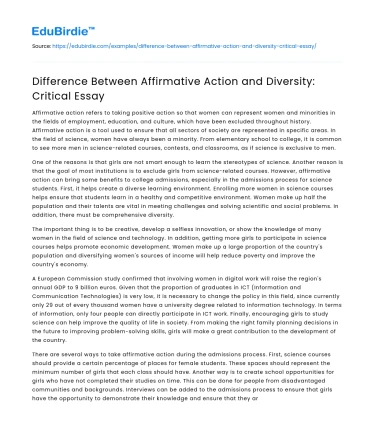Affirmative action refers to taking positive action so that women can represent women and minorities in the fields of employment, education, and culture, which have been excluded throughout history. Affirmative action is a tool used to ensure that all sectors of society are represented in specific areas. In the field of science, women have always been a minority. From elementary school to college, it is common to see more men in science-related courses, contests, and classrooms, as if science is exclusive to men.
One of the reasons is that girls are not smart enough to learn the stereotypes of science. Another reason is that the goal of most institutions is to exclude girls from science-related courses. However, affirmative action can bring some benefits to college admissions, especially in the admissions process for science students. First, it helps create a diverse learning environment. Enrolling more women in science courses helps ensure that students learn in a healthy and competitive environment. Women make up half the population and their talents are vital in meeting challenges and solving scientific and social problems. In addition, there must be comprehensive diversity.
The important thing is to be creative, develop a selfless innovation, or show the knowledge of many women in the field of science and technology. In addition, getting more girls to participate in science courses helps promote economic development. Women make up a large proportion of the country's population and diversifying women's sources of income will help reduce poverty and improve the country's economy.
A European Commission study confirmed that involving women in digital work will raise the region's annual GDP to 9 billion euros. Given that the proportion of graduates in ICT (Information and Communication Technologies) is very low, it is necessary to change the policy in this field, since currently only 29 out of every thousand women have a university degree related to information technology. In terms of information, only four people can directly participate in ICT work. Finally, encouraging girls to study science can help improve the quality of life in society. From making the right family planning decisions in the future to improving problem-solving skills, girls will make a great contribution to the development of the country.
There are several ways to take affirmative action during the admissions process. First, science courses should provide a certain percentage of places for female students. These spaces should represent the minimum number of girls that each class should have. Another way is to create school opportunities for girls who have not completed their studies on time. This can be done for people from disadvantaged communities and backgrounds. Interviews can be added to the admissions process to ensure that girls have the opportunity to demonstrate their knowledge and ensure that they are admitted to science courses.






 Stuck on your essay?
Stuck on your essay?

